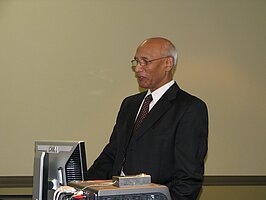1st Distinguished Water Seminar
Dr. Vijay Singh, Linked for Life: The Importance of Sustaining Hidden Connections for Conservation in Streams

The annual 1st Distinguished Water Seminar sponsored by the Institute was held on October 7, 2010. The featured speaker was Dr. Vijay Singh, Dept. of Fish, Wildlife, and Conservation Biology, and Graduate Degree Program in Ecology, Colorado State University
Dr. Vijay P. Singh, a nationally and internationally well-known hydrologist. Dr. Vijay Singh holds the Caroline and William N. Lehrer Distinguished Chair in Water Engineering, and is a Professor of Biological and Agricultural Engineering, and a Professor of Civil & Environmental Engineering at Texas A & M University. He has a Ph.D. in Civil Engineering from Colorado State University and a D.Sc. in Water Resources and Environmental Engineering from the University of the Witwatersrand, Johannesburg, South Africa. His specialty is hydrology, hydraulics, irrigation, and water resources engineering. He has authored or co-authored 15 textbooks; edited 50 reference books; and published more than 525 refereed journal articles, 70 book chapters, 320 conference papers, and 70 technical bulletins. He has received more than 55 national and international awards, including the Arid Lands Hydraulic Engineering Award, the Torrens Awards, the Norman Medal, and the Vent Te Chow Award of American Society of Civil Engineers; and the R.K. Linsley Award of American Institute of Hydrology. Currently he is serving as Editor-in-Chief of Journal of Hydrologic Engineering, and Journal of Water Science and Engineering, and of Springer’s Water Science and Technology Book series. He is a fellow of ASCE, AWRA, IWRS, ISAE, IASWC and IE. He is a fellow/member of 10 international science/engineering academies, including Polish Academy of Science, Czech Engineering Academy, Mexican Academy of Engineering, Mexican Academy of Science, Portuguese Academy of Science, Russian Academy of Ecological Sciences, Russian academy of Water Management Sciences, Georgia Academy of Science, Georgia Fazisi Academy, and National Academy of Agricultural Sciences (India).
Abstract:
In 2000 the World Economic Forum characterized climate change as the “greatest challenge facing the world at the beginning of the century.” In 2004, Jack Straw, British Foreign Secretary described climate change as “the most important long-term issue which we face as a global community.” The climate change challenge entails the water challenge, the food security challenge, the extreme event hazard challenge, and the ecosystem challenge. Imbued in the water challenge is the intensification of the hydrologic cycle translating into increased frequency of floods and droughts, heightened variability of rainfall, shortening of snowfall season, advanced start of spring snowmelt, accelerated glacial melting, and uncertain availability of freshwater, all impacting freshwater water availability, water quality, energy production, food production, and ecosystems. The lecture will discuss these impacts of climate change and what these changes mean for the public. It will be concluded with a personal reflection on a development paradigm and where we are heading as a society.


